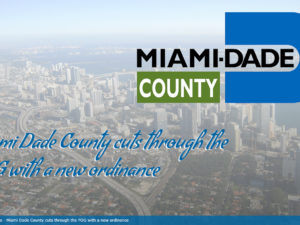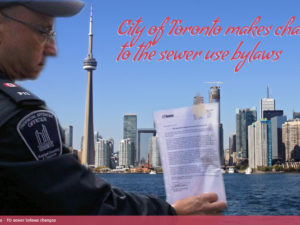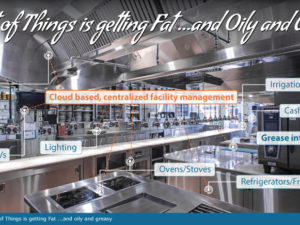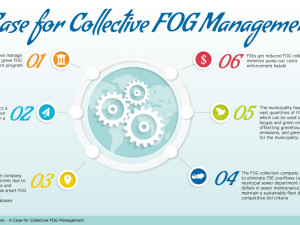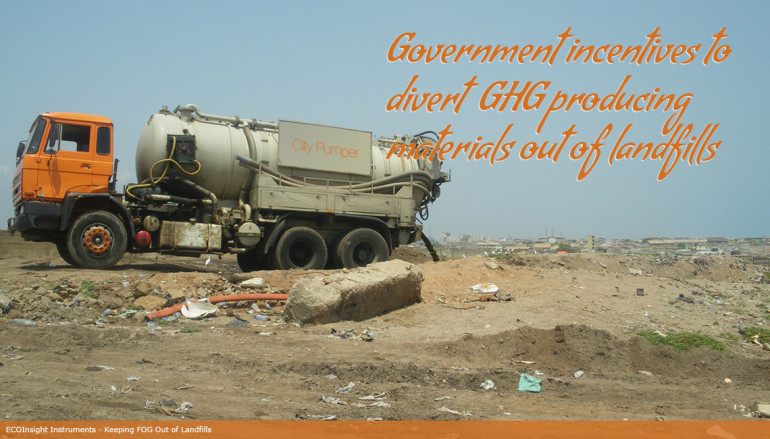
Keeping FOG Out of Landfills
It’s a pivotal moment in Ontario, Ecoinsight’s home province. The Ontario government has announced it’s plan to enact two key pieces of environmental legislation; a greenhouse gas cap and trade act, and a waste reduction act, both within the next year. As anyone who has been in the environmental industry for any period of time knows, significant regulation change creates significant new market needs and opportunities.
Government incentives to divert GHG producing materials out of landfills
To learn more about these key pieces of regulation, I attended the 2015 Conference on Waste Management and GHG Reduction put on jointly by the Air & Waste Management Association and the Ontario Environmental Industry Association. The one-day conference was packed with great speakers – all knowledgeable and leaders in consulting, industry, services and government. My specific interest was the impact that these new regulations would have on the FOG Ecosystem, the monitoring, collection and disposal of Fats, Oils and Grease (FOG) from food service establishments. Fats oils and greases are comprised of triglycerides that will naturally decompose in landfills to CO2 and methane, the main contributors to greenhouse gases. Keeping FOG out of landfills is a major objective of Ecoinsight’s FOGWISE smart meter and FOG management system.
The speakers for the section on GHGs and Cap-and-Trade were Peter Klaassen and Mike Kennedy, from RWDI Consulting Engineers and John Georgakoploulos, from Willms & Shier Environmental Lawyers.
My top takeaways from these presentations
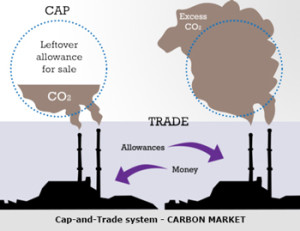 The Ontario government has elected to use the Cap-and-Trade system of carbon pricing as a means to hit its GHG reduction targets. The regulation will be promulgated in 2016 and will be in effect in 2017.
The Ontario government has elected to use the Cap-and-Trade system of carbon pricing as a means to hit its GHG reduction targets. The regulation will be promulgated in 2016 and will be in effect in 2017.- In the Cap-and-Trade system (see figure) emitters have their GHG emissions capped and lowered over time. Emitters that are above the cap must pay emitters with excess cap space for GHG allowances, or must pay for offsets from technologies that reduce GHGs such as wind turbines or solar energy producers.
- The waste management industry (including landfills) will be regulated and their emissions will be capped. Therefore, landfills will have very strong incentives to divert GHG producing materials such as FOG and other organics. It was suggested that landfills may stop taking organic waste altogether in Ontario. In any event, the current pricing model will be changed significantly and increases will be passed on to the FOG pumping companies and eventually back to food service companies
- The Ontario government plans to make the Cap-and-Trade system revenue neutral, meaning that any revenues received by the government will be put back into programs for reducing GHGs. The FOG Ecosystem is a prime candidate for funding.
- Municipalities may have access to funds for carbon reducing programs
There will exist a new market in GHG allowance credits (offsets) for technologies that replace carbon emitting technologies. The FOG ecosystem creates a GHG offset that emitters can purchase.
The Cap-and-Trade system may significantly change some of the pricing models for pumpers as landfilling FOG becomes significantly more expensive (or not allowed), and FOG for anaerobic digesters produces offset revenues.
I fully support the new Ontario Cap-and-Trade and waste diversion systems. In the FOG waste subsector that I work in, I envision a “FOG Ecosystem” wherein municipalities use FOGWISE smart meter technology to manage their FOG resource. Financing of the initial capital for the smart meters can be partially offset by provincial programs for GHG reduction technologies. In collaboration with the pumper industry, municipalities now own/control the FOG resource and can divert FOG from landfills to anaerobic digesters to create biogas energy. The added bonus to the FOG Ecosystem is that FOG is kept out of the sewers, eliminating grease blockages and overflows.
It’s an obvious win-win-win. It just needs someone to champion it.

